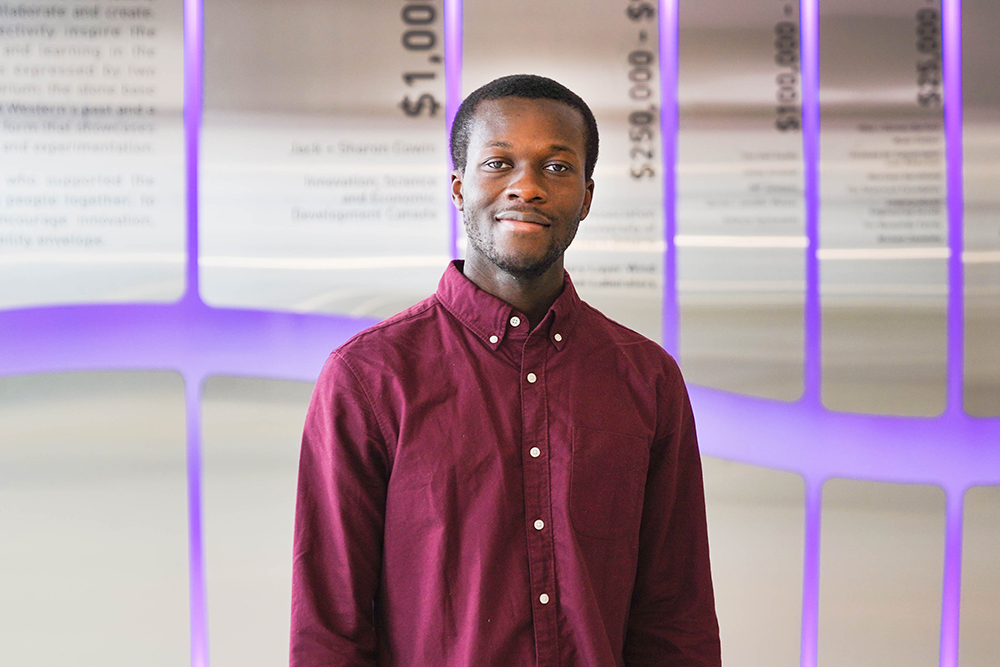Media
Contact
Communications Specialist
Faculty of Engineering
Spencer Engineering Building
Room 2072
Western University
Tel: 519-661-2111 ext. 87015
Email: engineeringcomms@uwo.ca
Patrick Adjei: IBET Fellow advances AI safety in unpredictable environments

Patrick Adjei marks a historic achievement as the first fellow from Western to graduate from the Indigenous and Black Engineering and Technology (IBET) PhD Project. (Western Engineering)
Patrick Adjei, a newly minted PhD grad in electrical and computer engineering at Western University, convocated on June 10 – marking a major milestone not only for his academic journey but also for a national initiative aimed at advancing equity in STEM.
Adjei is Western’s first fellow from the Indigenous and Black Engineering and Technology (IBET) PhD Project to graduate—a moment of significance for the IBET community and Western Engineering. The IBET program supports Indigenous and Black scholars pursuing doctoral studies in engineering and computer science through mentorship, financial aid, and a community of support.
“Being the first IBET fellow to graduate is a real honour, but it’s also a responsibility," said Adjei, who was supervised by professor Miriam Capretz and also completed his Master's at Western Engineering.
"I hope this journey can inspire more students from underrepresented backgrounds to take up space in research, bring fresh perspectives and pursue the questions that matter to them.”
Adjei’s PhD research tackles one such urgent question: how can we make artificial intelligence (AI) agents safer in unpredictable environments? His work focuses on reinforcement learning—an area of machine learning where AI agents learn by interacting with their surroundings. From autonomous vehicles to industrial robots, these systems must often make split-second decisions in complex, uncertain situations, where safety is critical.
His thesis, titled “Safety Consideration in Complex Environment with Reinforcement Learning,” proposes three innovative methods to reduce risky AI behaviour and improve decision-making in uncertain environments.
The first contribution improves how AI agents distinguish between “safe” and “unsafe” situations by modifying learning algorithms to establish clearer behavioural boundaries—helping systems better avoid dangers, even as conditions change.
The second draws from Prospect Theory, a concept from behavioural economics, to calibrate how agents perceive and respond to risk. Surprisingly, Adjei’s findings show that simply making AI overly cautious isn’t effective unless its risk sensitivity is finely tuned.
The final approach integrates Cumulative Prospect Theory directly into the AI decision-making process. Like humans who tend to overestimate the likelihood of rare but catastrophic events, this method gives AI systems a more realistic sensitivity to low-probability, high-impact risks. The result? Faster learning and more stable performance in simulations compared to traditional models.
“These methods offer three distinct but complementary ways to reduce unsafe AI behaviours—by defining safety boundaries, fine-tuning risk perception, and building human-like caution directly into the agent’s decisions,” said Adjei. “It’s work I hope can contribute to safer AI in areas like industrial systems, autonomous driving, and beyond.”
Lars Rehmann, associate dean, graduate and postdoctoral studies at Western Engineering, celebrated the milestone.
“Patrick has not only contributed a significant body of research to the field of AI safety, but he has also led the way as the first graduate of the IBET PhD Project,” said Rehmann. “His work represents the future of research, where innovation and equity go hand-in-hand. We are very proud of his accomplishments.”
Looking ahead, Adjei says he’s eager to continue exploring how AI systems can be made more trustworthy and responsible.
“I’d love to keep working on real-world applications of similar research,” he said. “Whether that’s in academia, industry, or through collaboration, I’m excited to build systems that prioritize both performance and safety.”

